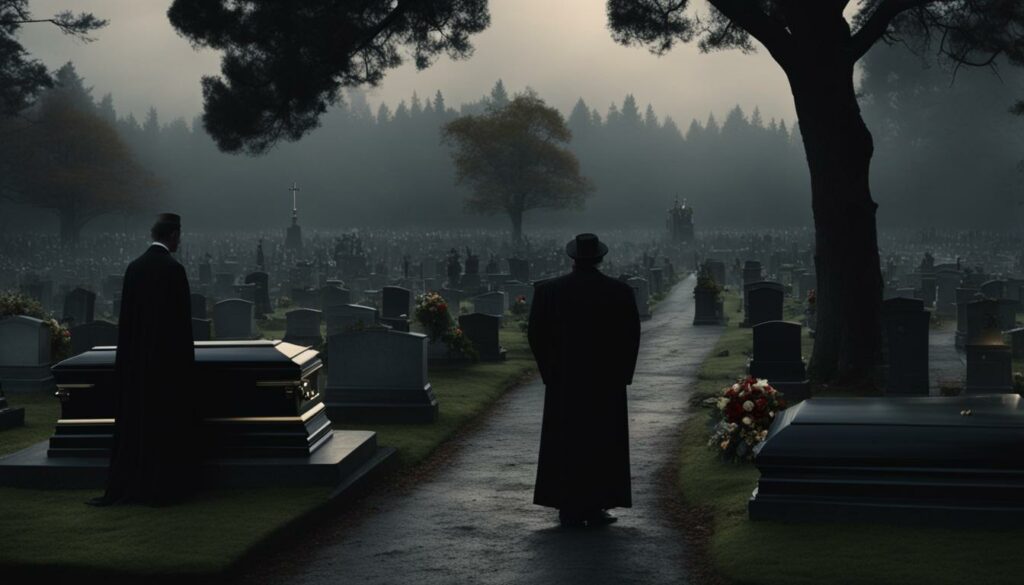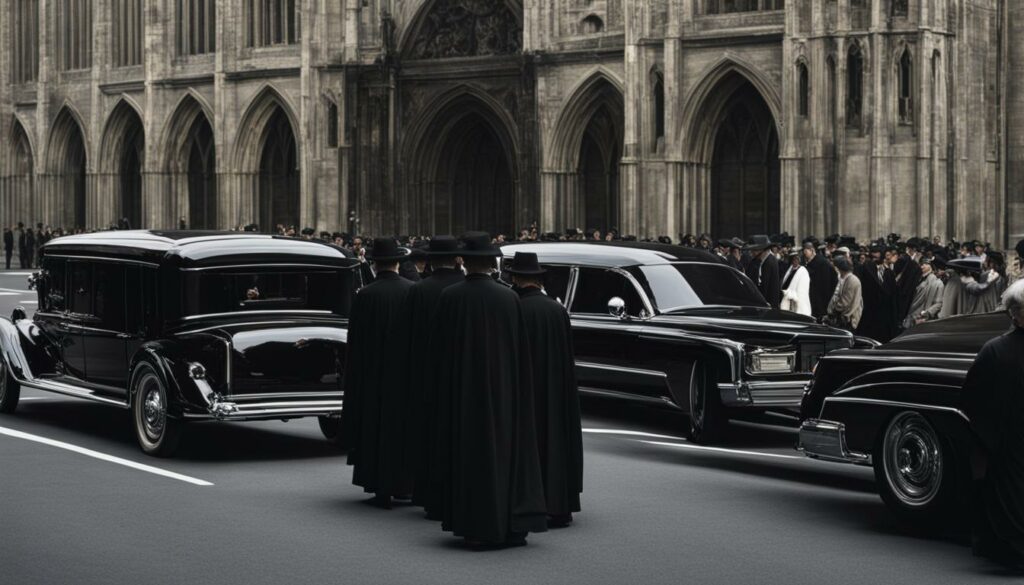When arranging a funeral, it is important to consider the options for cremation and funeral arrangements and how to prepare and transport the deceased. Funeral directors can provide guidance and support in these preparations, including collection and care of the deceased, planning and overseeing proceedings, and coordination with other parties involved in the funeral.
Key Takeaways
- Funeral directors can assist with the collection, care, and transportation of the deceased.
- Planning and overseeing funeral proceedings is an important part of funeral arrangements.
- Coordinating with other parties involved in the funeral can help ensure a smooth and respectful process.
Choosing a Funeral Director
When organizing a funeral, one of the first decisions you need to make is choosing a funeral director. Funeral directors play a crucial role in helping you navigate the complexities of funeral arrangements and providing the necessary guidance and support during this difficult time. They have the expertise to handle important tasks such as handling the deceased, organizing the proceedings, and ensuring that all legal requirements are met.
A reputable funeral director can offer invaluable guidance and support throughout the entire process. They can assist with important decisions, including selecting a suitable funeral venue, arranging transportation for the deceased, and coordinating with other service providers like florists and caterers. Funeral directors understand the emotional challenges you may be facing and are there to offer empathy and compassion.
Recommendations from trusted friends, family members, or the National Association of Funeral Directors can help you find a funeral director who is reliable and experienced. Take the time to research different funeral directors in your area, read reviews, and schedule consultations to discuss your specific needs and preferences. Ultimately, choosing a funeral director who understands your vision for the funeral and can provide the necessary support will ensure a fitting tribute for your loved one.

Table: Key Considerations When Choosing a Funeral Director
| Consideration | Explanation |
|---|---|
| Reputation | Check for recommendations and research online reviews to ensure the funeral director has a good reputation. |
| Experience | Choose a funeral director with experience in handling funerals, including the type of service you prefer. |
| Services Offered | Ensure the funeral director offers the services you require, such as transportation, arranging the funeral venue, and coordinating with other service providers. |
| Availability | Check if the funeral director is available on the desired dates and if they can accommodate any specific requests you may have. |
| Cost | Discuss the funeral director’s fees and any additional costs involved to ensure they are within your budget. |
| Personal Compatibility | Arrange a consultation with the funeral director to gauge their level of empathy, understanding, and willingness to accommodate your needs. |
Types of Funeral Services
When planning a funeral, there are several types of services to consider, including burial, cremation, and direct cremation. Each option has its own characteristics and costs, allowing you to choose based on your preferences and budget.
1. Burial
Burial is the traditional method of laying a loved one to rest in a cemetery. It involves the preparation of the body for interment, the selection of a burial plot, and the use of a casket for the final resting place. Burials can provide a sense of closure and a physical location for family and friends to visit and remember their loved ones.
2. Cremation
Cremation is a popular alternative to burial. It involves the process of reducing the body to ashes through intense heat. The ashes are then placed in an urn or scattered according to the deceased’s wishes. Cremation can be more cost-effective and flexible in terms of memorialization options, such as keeping the ashes at home, scattering them in a meaningful location, or interring them in a columbarium or cemetery.
3. Direct Cremation
Direct cremation is a simplified and affordable option in which the body is cremated without a formal funeral service or viewing. This option allows for a straightforward and efficient process, with the ashes typically returned to the family afterwards. Direct cremation can be a practical choice for those seeking a simple and cost-effective farewell.
When selecting the type of funeral service, it is important to consider the wishes of the deceased, cultural and religious customs, personal preferences, and financial considerations. Consulting with a funeral director can provide valuable guidance and assistance in making the right decision for your loved one.

| Types of Funeral Services | Characteristics | Cost Range |
|---|---|---|
| Burial | Traditional, physical resting place, cemetery visitation | £4,000 – £10,000+ |
| Cremation | Ashes in an urn or scattered, flexible memorialization options | £1,500 – £4,000 |
| Direct Cremation | No formal service or viewing, simplified process | £1,000 – £2,000 |
Funeral Costs and Financial Considerations
Planning a funeral involves various financial considerations, including funeral costs, funeral director fees, coffin costs, and additional services. It is important to have a clear understanding of these expenses to make informed decisions and manage your budget effectively.
Funeral costs can vary significantly depending on factors such as location, type of service, and additional services chosen. On average, a funeral in the UK can cost around £4,000, but this can increase depending on your choices. Funeral director fees typically make up a significant portion of the total cost, covering services such as arranging the funeral, coordinating with third parties, and providing support to the bereaved family.
| Expense | Average Cost |
|---|---|
| Funeral Director Fees | £1,500 – £2,500 |
| Coffin | £200 – £1,000 |
| Additional Services | Varies (e.g. flowers, catering, venue) |
Aside from funeral director fees, the cost of the coffin is another significant expense. Coffin costs can vary depending on the material, design, and additional features chosen. There are options available to suit different budgets, ranging from simple and affordable choices to more elaborate and expensive ones.
It is important to consider additional services that may be necessary or desired for the funeral. These can include flowers, catering for the wake, venue hire, transportation for the mourners, and any special requests you may have. These additional services can add up, so it is essential to prioritize and budget accordingly.
By understanding the various funeral costs and financial considerations involved, you can make informed decisions that align with your budget while still honoring the memory of your loved one.
Planning the Funeral Service
When it comes to planning a funeral service, there are several factors to consider. First and foremost, it is essential to check if the deceased had any specific wishes or instructions outlined in a will or funeral plan. These instructions can guide you in selecting the type of service and personalizing it to honor the life of your loved one.
There are various types of funeral services to choose from, depending on the individual’s preferences and cultural or religious beliefs. Some common options include religious funerals, cremation services, green and woodland funerals, humanist and civic funerals, and burial at sea. Each type of service has its own unique elements, attire, and rituals, allowing you to create a meaningful and personalized farewell.
Once you have decided on the type of service, you can start planning the details. This includes selecting a suitable funeral venue and date that can accommodate the expected number of attendees. You may want to consider a venue that holds significance to the deceased or has the appropriate facilities for the service you have chosen.
In addition to the venue, there are other aspects of the funeral service that can be personalized. These include the order of service, which outlines the schedule of the service and includes elements such as speakers, songs, readings, and prayers. The order of service can be designed to reflect the individual’s personality and interests, incorporating their favorite music, meaningful quotes, and cherished memories. It is an opportunity to create a heartfelt tribute to their life.
To help you visualize the different types of funeral services and their elements, here is a table summarizing the key features:
| Type of Service | Description | Attire | Personalization |
|---|---|---|---|
| Religious Funeral | A service conducted according to the deceased’s religious beliefs and traditions. | Traditional religious attire or formal attire. | Selection of religious readings, hymns, and rituals. |
| Cremation Service | A service specifically tailored for cremation, including the option for ashes scattering or interment. | Formal attire or casual dress code. | Choice of music, readings, and personalized tribute video. |
| Green and Woodland Funeral | A service held in a natural environment, focused on eco-friendly practices. | Natural or casual attire with consideration for the environment. | Planting a tree or flowers as a symbol of remembrance. |
| Humanist and Civic Funeral | A non-religious service that celebrates the life and values of the deceased. | Formal attire or casual dress code. | Personalized eulogies, music, and readings reflecting the individual’s beliefs and contributions. |
| Burial at Sea | A service conducted onboard a ship, allowing for the scattering or burial of the ashes at sea. | Formal attire or casual dress code. | Reading of poems, personalized messages, and symbolic gestures during the ceremony. |
By carefully planning the funeral service, you can create a meaningful and personalized tribute that honors the life of your loved one and provides comfort to those in attendance.
FUNERAL TRANSPORT ARRANGEMENTS
When organizing a funeral, one of the key considerations is the transportation of the deceased to the service. Traditionally, a hearse is used for this purpose, followed by friends and family in limousines as part of a procession. It provides a dignified and respectful way to convey the deceased to their final resting place. If you prefer a more personal touch, there are alternative options available for funeral transport.
In addition to the traditional hearse, you can choose unique ways to honor your loved one’s memory. Some families opt for specialized funeral transport, such as tractors, vintage cars, or even fire engines. These choices can be a meaningful reflection of the deceased’s interests, hobbies, or profession. Alternatively, you may decide to allow attendees to make their own way to the service, creating a more intimate and personal atmosphere.
Funeral directors can assist you in making the appropriate funeral transport arrangements. They have the knowledge and expertise to ensure that the chosen transport aligns with your wishes and meets any legal requirements. They can also help with planning the procession route, allowing you to pass through locations of significance, such as the deceased’s favorite places or important landmarks along the way. This can add a meaningful touch to the funeral proceedings and provide an opportunity for reflection and remembrance.
Remember, the choice of funeral transport is entirely up to you and what you believe best reflects the life and personality of your loved one. Whether you prefer a traditional hearse or a more unique mode of transport, the funeral director will work closely with you to plan and execute the transportation arrangements that pay tribute to your loved one with respect and dignity.
Creatin an Order of Service
An order of service is a crucial part of any funeral, serving as a program that outlines the details and sequence of events during the funeral service. It provides a helpful guide for attendees, ensuring that everyone is aware of what to expect and can follow along with the proceedings.
When creating an order of service, it is important to include essential information such as the full name, date of birth, and date of death of the deceased. You may also choose to include photographs or other personal touches that reflect their life and personality.
“The order of service serves as a tangible memento for family and friends to remember their loved one and the special moments shared during the funeral service.”
The program should include a schedule of the service, including the order of speakers, songs, readings, and prayers. This allows attendees to follow along and participate in the service. Additionally, you can include information about any burial or wake that will take place after the service, providing attendees with the necessary details if they wish to join.
Example Order of Service:
| Time | Activity |
|---|---|
| 10:00 am | Welcome and opening remarks |
| 10:15 am | Reading of a favorite poem |
| 10:30 am | Eulogy by a close friend |
| 10:45 am | Music: “Amazing Grace” |
| 11:00 am | Prayer and reflection |
| 11:15 am | Final words and closing remarks |
Creating a well-organized and visually appealing order of service can help to ensure that the funeral service runs smoothly and that attendees feel informed and included. It is a meaningful way to honor the memory of the deceased and provide comfort to those who are mourning.

Funeral Flowers and Charitable Donations
When planning a funeral, one of the thoughtful ways to pay tribute to the deceased is through funeral flowers. These floral arrangements serve as a symbol of love, respect, and remembrance. Funeral flowers can be arranged in various forms, such as wreaths, sprays, or bouquets, and can be customized to reflect the personality and interests of the departed.
Instead of flowers, an increasingly popular alternative is to request charitable donations in memory of the deceased. This not only honors their memory but also contributes to causes and organizations that were important to them during their lifetime. Charitable donations can be a meaningful way to create a lasting impact and continue their legacy of giving back to the community.
“Funeral flowers are a beautiful way to express your condolences and show support to the grieving family. However, charitable donations provide an opportunity to make a difference in the lives of others in honor of your loved one.”
Whether you choose funeral flowers or charitable donations, it is important to communicate your preferences to the funeral director who can assist in making the necessary arrangements. They can provide guidance on reputable florists or suggest suitable organizations for charitable contributions, ensuring that your personal tribute is carried out in the most meaningful way.
Funeral Flower Arrangements
Options for funeral flower arrangements include:
- Wreaths: Circular arrangements that symbolize eternal life
- Sprays: Elegant displays that can be placed on top of the casket or at the service
- Bouquets: Handheld arrangements that can be given to family members or displayed at the service
Charitable Donation Suggestions
Consider charitable organizations that align with your loved one’s values and interests, such as:
- Health-related charities
- Education and research foundations
- Animal shelters and wildlife conservation organizations
- Religious or faith-based charities
- Community service organizations
| Pros of Funeral Flowers | Pros of Charitable Donations |
|---|---|
| Symbolic gesture of remembrance | Contributes to meaningful causes |
| Provides comfort and support to the grieving family | Creates a lasting impact and legacy |
| Allows for personalization and customization | Reflects the values and interests of the deceased |
Getting Assistance with Funeral Costs
Planning a funeral can be a challenging and emotionally demanding task, especially when considering the financial aspects. If you find yourself in need of help with funeral costs, there are various options available to you. Funeral directors can offer valuable advice on potential sources of financial assistance and guide you through the process of securing the necessary funds.
One avenue to explore is funeral expenses payment from the government. Depending on your circumstances and eligibility, you may be entitled to financial support towards the cost of the funeral. Additionally, charities such as The Bereavement Trust offer support and assistance for those who are struggling with funeral expenses. It’s important to reach out and inquire about the specific criteria and application process for each option.
If the deceased had funds in a bank or building society account, it may be possible to settle the funeral bill using those funds. Speaking with the bank or building society can provide clarity on the available options and processes for covering the funeral costs. Funeral plans, life insurance policies, or funds from the deceased’s estate are also potential sources to consider for financial assistance.
Remember, you don’t have to navigate these challenges alone. Funeral directors and support organizations are there to guide you through the process and help you find the best solutions for your specific situation. By seeking assistance with funeral costs, you can alleviate some of the financial burden and focus on giving your loved one a fitting farewell.

How to Get Help with Funeral Costs:
- Contact a reputable funeral director to discuss available options for financial assistance.
- Inquire about funeral expenses payment from the government and check your eligibility.
- Consider reaching out to charities, such as The Bereavement Trust, for support with funeral expenses.
- Speak with the deceased’s bank or building society to explore the possibility of settling the funeral bill using their funds.
- Assess funeral plans, life insurance policies, or funds from the deceased’s estate as potential sources of financial assistance.
| Source of Assistance | Key Details |
|---|---|
| Funeral Directors | Offer guidance on financial assistance options and application processes. |
| Government Funeral Expenses Payment | Financial support towards the cost of the funeral for eligible individuals. |
| The Bereavement Trust | Charitable organization providing support and assistance with funeral expenses. |
| Deceased’s Bank or Building Society | Check if funds from the deceased’s account can be utilized to settle the funeral bill. |
| Funeral Plans, Life Insurance Policies, or Deceased’s Estate | Explore the availability and applicability of these resources for financial assistance. |
Conclusion
As you reach the conclusion of your funeral planning journey, it’s important to reflect on the various aspects of cremation and funeral arrangements you have considered. By carefully selecting a reputable funeral director, you ensure that all necessary preparations and transportation of the deceased are handled with utmost care and professionalism.
Choosing the type of funeral service, whether it be a burial, cremation, or direct cremation, allows you to honor the wishes and plans of the deceased. It is also an opportunity to personalize the service, from selecting a suitable funeral venue to creating a heartfelt order of service that reflects the unique life and personality of your loved one.
While navigating the financial considerations of a funeral, exploring options to lower costs, such as opting for a direct cremation and considering charitable donations in lieu of funeral flowers, can provide a meaningful and affordable way to honor the memory of the deceased. Seeking assistance with funeral costs, whether through government support, charities, or available benefits, can help alleviate the financial burden during this challenging time.
Throughout the entire process, remember to lean on the guidance and support offered by funeral professionals. By considering individual wishes and preferences, and by approaching each aspect of funeral planning with care and consideration, you can ensure that the journey through cremation and funeral arrangements is managed with compassion and respect.
FAQ
What should I consider when arranging a funeral?
When arranging a funeral, it is important to consider options for cremation and funeral arrangements and how to prepare and transport the deceased. Funeral directors can provide guidance and support in these preparations, including collection and care of the deceased, planning and overseeing proceedings, and coordination with other parties involved in the funeral.
Should I engage the services of a funeral director?
Engaging the services of a funeral director can be beneficial as they can take care of important tasks such as handling the deceased, organizing the proceedings, and offering general guidance and support. They can also ensure that the deceased is treated with respect and dignity. Recommendations from the National Association of Funeral Directors can be helpful in finding a reputable funeral director.
What are the different types of funeral services?
The most common types of funeral services are burials, cremations, and direct cremations. Burials are typically the most expensive option, while direct cremation is usually more affordable. It is important to consider any specific wishes or plans the deceased may have had regarding the type of service. When choosing a coffin, there are various options available, including solid wood, chipboard, metal, cardboard, and biodegradable materials.
How much does a funeral typically cost?
Funerals can be expensive, with the average cost in the UK being around £4,000. This cost typically includes funeral director fees, doctor’s fees, clergy or officiate fees, and the cost of the coffin. It is important to consider which services are essential and which can be omitted to help reduce costs. Funeral plans, life insurance policies, or funds from the deceased’s estate can help cover the expenses. There are also options available to lower costs, such as choosing a direct cremation, opting for a cheaper coffin, and making food for the wake instead of hiring a caterer.
How do I plan the funeral service?
Before planning the funeral service, it is essential to check if the deceased had any specific wishes or instructions outlined in a will or funeral plan. There are various types of funeral services to choose from, including religious funerals, cremation services, green and woodland funerals, humanist and civic funerals, and burial at sea. The type of service will determine the attire and various aspects of the service that can be personalized, such as the music, eulogy, funeral flowers, and poems. Choosing a suitable funeral venue and date is also important in planning the service.
What are the options for funeral transport arrangements?
When organizing a traditional funeral, a hearse is typically used to transport the deceased to the service, followed by friends and family in limousines. However, there is also the option to choose more personal funeral transport, such as tractors, fire engines, or asking attendees to make their own way to the service. Funeral directors can assist in arranging the appropriate transportation. Planning the route for the procession can also be a meaningful way to honor the deceased by passing through locations of significance.
What is an order of service?
An order of service is a booklet or program that outlines the details of the funeral service. It usually includes photos, the full name, date of birth, and date of death of the deceased, as well as the schedule of the service, including speakers, songs, readings, and prayers. It is an opportunity to personalize the order of service with family photos and quotes. The order of service can also include information about the burial or wake that follows the service.
What are alternatives to funeral flowers?
Funeral flowers can be a thoughtful way to pay tribute to the deceased, and friends and family may also choose to send flowers. However, instead of flowers, it is becoming increasingly common to request charitable donations in memory of the deceased. This can be a more meaningful way to honor their values and causes that were important to them.
How can I get assistance with funeral costs?
There are various ways to get assistance with funeral costs. Funeral directors can provide advice on available options and benefits that may help cover the expenses. Additionally, there are charities, such as The Bereavement Trust, that offer support, and government funeral support may be available for those who are eligible. In some cases, the deceased’s bank or building society may be able to settle the funeral bill from their account.
What should I consider when planning a funeral?
Planning a funeral involves making important decisions regarding cremation and funeral arrangements, including selecting a funeral director, choosing the type of service, considering financial aspects, arranging the funeral transport, and personalizing the funeral service details. It is essential to seek guidance and support from funeral professionals and consider individual wishes and preferences. By simplifying the process and addressing each aspect with care, the journey through cremation and funeral arrangements can be made more manageable.

